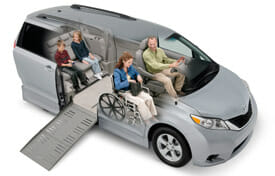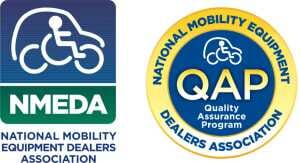Beware Alternative Buying Options
As in any industry, there are organizations that will offer alternative routes to visiting your local dealer. However, you must be cautious, as most of these online retailers are only concerned with a sale. The idea of buying a vehicle, especially a wheelchair accessible one online, sight unseen generally doesn’t work out to be the best of ideas, and we caution you on making such a purchase. Sure, the slight cost savings might be tempting, but we’ve seen time and time over, these company’s delivering their customers a handicap vehicle that doesn’t fit, or address their needs, and leaves them in the end without proper service options and support.
The following list of considerations is designed to further assist you in your journey, and to help alleviate any concerns you may be having.
Top 10 Considerations
1. Know Your Options
When it comes to assistive technology for automobiles, there are now more options than ever! There are literally dozens of model variations and types of wheelchair accessible vehicles available, as well as lifts, and driving aids. Not everyone may need a wheelchair accessible vehicle, a lift might be a better fit. It’s best to know all your options going in and the alternative products available, it could save you a bunch.
2. Tap The Dealer’s Expertise
Find a dealer with experience! By no means be afraid to ask questions. Mobility consultants are here for you with their expertise and assistive technology experience. They truly are your best resource for answers to all your questions and concerns, regardless how big or small.
3. Choose an Accredited Dealer
The National Mobility Equipment Dealers Association (NMEDA) is a national organization dedicated to advocating for safe and reliable modifications in the accessible vehicle market. Dealers belonging to this organization are the top in their field, and are committed to the quality and safety of their products and services. Routine audits and program compliance is necessary to be part of this prestigious organization. Look for this logo when doing business.
When it comes to service and installation of mobility products, NMEDA offers an additional certification program called (QAP), or Quality Assurance Program. This is the only nationally recognized accreditation program for the adaptive mobility industry. Before getting your wheelchair accessible vehicle, lift, or driving aid serviced or installed, be sure you choose a dealer part of this program. By choosing an accredited QAP dealer, you are ensuring they have met the stringent qualities of the organization, and that they also provide the benefits associated: 24/7 emergency service, and service by trained technicians who have met only the highest of standards.
4. Know the Value of Quality and Experience
Like most products, the mobility industry is also saturated with substandard, “customized” accessible vehicles. We urge you to be very careful when considering one of these vehicles. These vehicles are mostly found sold by companies who only sell their products online, without a nationwide supporting dealer network. These vehicles are often sold sight unseen, many times resulting in buyer’s remorse after the sale and lack of servicing options.
When considering a dealer for a purchase, it is key to find a dealer with a track record of performance. Is the dealership reputable? How satisfied are their customers? Do they have referrals and/or customer reviews available? Are there any unsatisfied complaints with the BBB, or states Attorney General? Bottom line, do your homework on both the dealer and the product you are considering to purchase.
5. Get References
Don’t be afraid to ask your prospective dealer for any references from professional organizations, or customers who would be willing to talk about their purchase, buying experience, and whether they were satisfied with the service they’ve received both during and after the sale.
6. Consider the Warranty
While not usually on top-of-your-mind until you need it, when making a purchase such as a wheelchair accessible vehicle, the warranty of the product you choose is important. Most reputable conversion companies offer warranties on their new conversion components that match the chassis warranty of the vehicle. Most often, this term is a 3 year/36,000-mile warranty. However, there are numerous alternatives to consider if you desire longer coverage. Be sure to ask a mobility consultant for more information.
7. Get the Right Fit
We cannot stress the importance of this aspect when purchasing a wheelchair accessible vehicle. The size of the wheelchair user, the size of the wheelchair itself, and the size of the family/occupants must all be taken into account when selecting the right vehicle on top of many other factors. This is where it becomes extremely important that you are completely transparent about your disability, any limitations and needs, both immediate and future. Just like any disability, there are many variables that come into play which can affect decisions: age, level of dexterity, and countless others. Your answers to these questions will make it possible for a mobility consultant to recommend the correct type, size, and model of accessible vehicle needed to address your needs and desires.
8. Decide Between a Rear-Entry, or a Side-Entry Conversion
There are two basic types of wheelchair accessible vehicles, side-entry and rear-entry. In a side-entry vehicle the ramp deploys from the side door, allowing the wheelchair user access to the center and front seating areas of the vehicle. This is by far the most popular type of conversion, and the only choice for a user if he/she is planning to drive. In a rear-entry vehicle, the ramp deploys from the rear hatch area, allowing the wheelchair user access to the rear and midsection of the vehicle, but not the front. Users in rear entry conversions are unable to ride in the front driver, or passenger seating area.
As with anything, there are always pros and cons of each option, so be sure to discuss these with your mobility consultant.
9. Buying a Modified Vehicle vs. Having a Vehicle Modified
Purchasing a pre-modified vehicle from a dealer’s inventory certainly has its benefits. Namely, convenience and the ability to touch, feel and ride in the finished product. However, some users may already have an unconverted vehicle that they own, but now have a need for a conversion. With limitations on age, mileage and type, a user’s unconverted vehicle can usually be sent to the factory to be modified. To find out more about this option and the exact requirements, be sure to ask a mobility consultant.
10. Take Your Time
Dealers are called “consultants” because that is exactly what they are; not salespeople, but consultants working with you to find the best solution for your immediate and future needs, and help you regain your independence. Ultimately, decisions are up to you, but your mobility consultant will ensure you know all your options and recommend a vehicle that is a perfect fit. For this reason, mobility consultants don’t look for a, “quick sale”. The process will more likely lead to developing a long-lasting friendship because of the amount of information you will exchange, and the confidence you develop.
It is our goal at Superior Van and Mobility to address any questions, or apprehensions you may experience with the utmost compassion and understanding. Our mobility consultants strive to make your purchase as easy and comfortable as possible. If at any time you have questions, please feel free to reach out to any one of our locations and we’ll be happy to assist.





